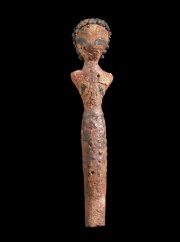Mucilage
Description
A gummy paste extracted from seeds, roots, or other plant parts with Water. Mucilage, also called vegetable glue, contains Arabinose, Glucose, and Galactose. It is commercially obtained from plant seeds (guar bean, Fleaseed, locust bean, tamarind seed, etc.), Seaweed (agar agar, and Carrageenan, etc.) and as a byproduct of paper making. In plants, mucilage provides a stored reserve of food and thickens the cell walls. Once extracted, mucilage is a sticky gelatinous mass that is most often used as a paper adhesive although it has low bonding strength. In conservation, the name mucilage has been applied generically to any aqueous based adhesive paste, such as a water-soluble Gum or Fish glue. Mayer (1969) gives mucilage as a cooked Gum arabic solution with added preservatives.
Synonyms and Related Terms
mucílago (Esp.); mucilage (Fr.); vegetable glue; vegetable paste
Physical and Chemical Properties
Soluble in water. Insoluble in ethanol.
Resources and Citations
- G.S.Brady, Materials Handbook, McGraw-Hill Book Co., New York, 1971
- Ralph Mayer, A Dictionary of Art Terms and Techniques, Harper and Row Publishers, New York, 1969 (also 1945 printing)
- Theodore J. Reinhart, 'Glossary of Terms', Engineered Plastics, ASM International, 1988
- Richard S. Lewis, Hawley's Condensed Chemical Dictionary, Van Nostrand Reinhold, New York, 10th ed., 1993
- Boise Cascade Paper Group, The Paper Handbook, Boise Cascade, Portland OR, 1989
- Matt Roberts, Don Etherington, Bookbinding and the Conservation of Books: a Dictionary of Descriptive Terminology, U.S. Government Printing Office, Washington DC, 1982
- Random House, Webster's Encyclopedic Unabridged Dictionary of the English Language, Grammercy Book, New York, 1997
- The American Heritage Dictionary or Encarta, via Microsoft Bookshelf 98, Microsoft Corp., 1998
- Art and Architecture Thesaurus Online, http://www.getty.edu/research/tools/vocabulary/aat/, J. Paul Getty Trust, Los Angeles, 2000
